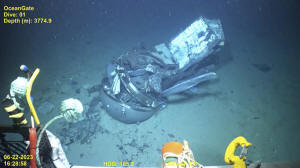Titan submersible disaster CEO could have been charged criminally if he
survived, Coast Guard says
[August 06, 2025]
By PATRICK WHITTLE and SAFIYAH RIDDLE
PORTLAND, Maine (AP) — The Titan submersible disaster could have been
prevented, the U.S. Coast Guard said in a report Tuesday that held
OceanGate CEO Stockton Rush responsible for ignoring safety warnings,
design flaws and crucial oversight which, had he survived, may have
resulted in criminal charges.
Rush and four passengers were killed instantly deep below the North
Atlantic in June 2023 when Titan suffered a catastrophic implosion as it
descended to the wreck of the Titanic. A multiday search for survivors
off Canada grabbed international headlines, and the tragedy led to
lawsuits and calls for tighter regulation of the burgeoning private deep
sea expedition industry.
The Coast Guard determined that safety procedures at OceanGate, a
private company based in Washington state, were “critically flawed” and
found “glaring disparities” between safety protocols and actual
practices.
Preventing the next Titan disaster
Jason Neubauer of the Marine Board of Investigation said the findings
will help avoid future tragedies.
“There is a need for stronger oversight and clear options for operators
who are exploring new concepts outside of the existing regulatory
framework,” he said in a statement.
Salvatore Mercogliano, a professor of maritime history at Campbell
University in North Carolina, said OceanGate was able to exploit gray
areas in maritime law that made it unclear who was responsible for
enforcing regulations.

Now, he said, the Coast Guard and other international maritime agencies
will be looking to improve coordination and implement clearer mechanisms
for enforcement, especially for private submarines.
“Unfortunately almost all maritime regulation is written in blood, and
something had to happen first,” Mercogliano said.
OceanGate suspended operations in July 2023. Spokesperson Christian
Hammond said the company has been wound down and was fully cooperating
with the investigation, and he offered condolences to the families of
those who died and everyone affected.
‘Red flags’ at OceanGate
Investigators pointed to a culture at OceanGate of downplaying, ignoring
and even falsifying key safety information to improve its reputation and
evade scrutiny from regulators.
The company ignored “red flags” and had a “toxic workplace culture,”
with firings of senior staff and the looming threat of dismissal used to
dissuade employees and contractors from expressing safety concerns.
Rush, a former flight test engineer for fighter jets, founded the
company in 2009 after years of experience in aerospace and aviation.
The Marine Board concluded that Rush had an “escalating disregard for
established safety protocols,” which contributed to the deaths. If Rush
were alive, the board would have passed the case to the U.S. Department
of Justice and he may have faced criminal charges, it said.
Rush bragged that he would ‘buy a congressman’ if challenged
The company reclassified submersible passengers as “mission specialists”
to bypass regulations on small passenger vessels and claim its subs were
oceanic research vessels. Former mission specialists and OceanGate
employees said their participation was “purely for a ride in the
submersible, not for scientific research,” the report said.
Rush and OceanGate received numerous warnings about Titan’s fraudulent
classifications. In 2017, Rush was told by a Coast Guard Reserve officer
hired by OceanGate that his planned Titanic dive would be illegal.
[to top of second column]
|

This June 2023 United States Coast Guard still frame from video
provided by Pelagic Research Services, shows remains of the Titan
submersible, center, on the floor of the Atlantic Ocean. (U.S. Coast
Guard Video courtesy Pelagic Research Services via AP)

Rush said “he would buy a congressman” if ever confronted by
regulators, the officer testified.
Over the years the company resorted to increasingly deceptive
strategies, the report said. By 2021 an OceanGate attorney falsely
told a Virginia federal court, which was presiding over Titan’s
authorization to conduct dives, that the vessel was registered in
the Bahamas.
To obtain his credentials, Rush submitted a fraudulent sea service
letter signed by OceanGate’s chief operations officer to the Coast
Guard’s National Maritime Center, the report said. In it Rush
claimed past service as a crew member on Titan and misrepresented
the size of the vessel, when in fact it had never been registered or
admeasured.
Titan's inadequacies
Investigators found that the submersible’s design, certification,
maintenance and inspection process were all inadequate. The vessel's
carbon fiber hull design and construction introduced flaws that
“weakened the overall structural integrity” of the hull, according
to the report.
Mounting financial pressures in 2023 led to a decision by OceanGate
to store the submersible outdoors in the Canadian winter, and the
hull was exposed to temperature fluctuations that also compromised
the vessel's integrity, the report said.
The victims
The implosion also killed French underwater explorer Paul-Henri
Nargeolet, known as “Mr. Titanic”; British adventurer Hamish
Harding; and two members of a prominent Pakistani family, Shahzada
Dawood and his son Suleman Dawood.
Nargeolet's family filed a $50 million lawsuit last year alleging
that the crew experienced “terror and mental anguish” before the
disaster. The lawsuit accused OceanGate of gross negligence.

Titan's final dive
The vessel had been making voyages to the Titanic site since 2021.
Its final dive came the morning of June 18, 2023. The submersible
lost contact with its support vessel about two hours later and was
reported overdue that afternoon. Ships, planes and equipment were
rushed to the scene about 435 miles (700 kilometers) south of St.
John's, Newfoundland.
The Coast Guard-led team operated under the possibility that there
could be survivors for several days. Wreckage was subsequently found
on the ocean floor about 330 yards (300 meters) off the bow of the
Titanic.
___
Riddle reported from Montgomery, Alabama. Associated Press writers
Kimberlee Kruesi in Providence, Rhode Island, and Leah Willingham in
Boston contributed.
All contents © copyright 2025 Associated Press. All rights reserved
 |